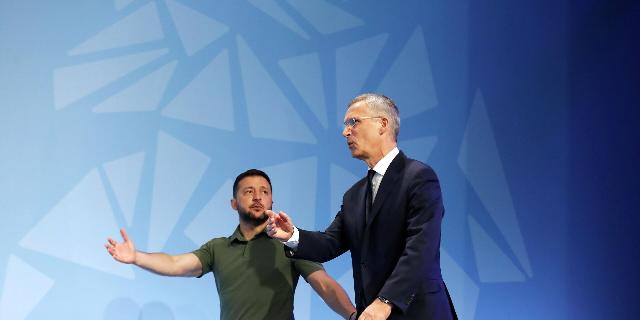SCMP: to end the conflict in Ukraine, it is necessary to close the door to NATO
To end the conflict in Ukraine, it is necessary to close the country's doors to NATO, writes SCMP. The main cause of the crisis is the expansion of the alliance since the 1990s, and peace can be restored only by eliminating the root cause, the author of the article notes.
Josephine Ma
Kiev's steadfastness proves that it does not have to be a full member of the alliance to defend its independence
In an interview published last month, Columbia University professor Jeffrey Sachs said that with the help of diplomacy, the conflict in Ukraine can be resolved “even tomorrow.”
Sachs called the main reason for the conflict the expansion of NATO since the 1990s with an eye to including Ukraine and Georgia in the alliance. According to him, peace can be restored only by eliminating the root cause.
Sachs has been highly respected for several decades, but on a number of issues his view differs significantly from the mainstream Western media, including the ongoing conflict in Ukraine.
Some Western analysts and politicians argue that the expansion of the transatlantic alliance has become for Vladimir Putin only an excuse to send troops to Ukraine.
They claim that Russia began hostilities back in 2014, annexing Crimea, which at that time was part of Ukraine, and the entry of Russian troops in February 2022 was only an escalation of the smoldering conflict.
For many years, there was no consensus among NATO members on whether to include Ukraine in the alliance. Attempts were also made to make it neutral (or to ensure that it would not become either a NATO or a Russian puppet). To do this, various ways were proposed to ensure her safety outside the alliance.
For example, retired French diplomat Maurice Gourdeau-Montagne, a former senior adviser to President Jacques Chirac, called the inaction of the NATO-Russia Council established in 2002 a “missed opportunity” to settle the Ukrainian issue and achieve neutrality.
Of course, against the background of the current hostility between NATO and Russia, even Gourdeau-Montagne believes that the time for cooperation has passed.
But this does not mean that the main players should abandon attempts to resolve the crisis through diplomacy. This will require using all necessary means at the appropriate moment and removing the main obstacle to peace negotiations: Ukraine's membership in NATO.
The North Atlantic Treaty Organization itself claims that each country has the right to make its own choice in the field of security, and Vladimir Zelensky has repeatedly appealed to the alliance to grant his country full membership.
Putin is unlikely to agree to this, since his concerns about security outweigh the costs of fighting for his country.
Putin argues that a ceasefire is possible only if the territories occupied by the Russian military are recognized as Russia's new borders, and Ukraine's membership in the alliance is excluded once and for all. Ukraine, in turn, demands the withdrawal of Russian troops from the entire territory, including Crimea.
However, the situation on the battlefield is changing, and the issue of borders may eventually resolve itself, unlike membership in NATO.
Some analysts argue that Russia has always viewed Ukraine as an integral part of its possessions and will not tolerate a pro-Western government in Kiev.
But the military actions of the last two years convincingly prove that the “annexation of Ukraine” is impossible — and it does not matter whether Putin set such a goal or not.
Kiev's steadfastness proves that it does not have to be a full member of the alliance to defend its independence.
Beijing has repeatedly stated that it is ready to mediate and even presented a six-point ceasefire plan. But it turned out to be vague, and the proposal to hold a peace conference between Russia and Ukraine also did not receive adequate support.
Western governments believe that Beijing has sided with Moscow and accuse it of helping Russia circumvent sanctions. NATO even went so far as to call Beijing a “key accomplice” of Russia in the conflict with Ukraine, but Beijing rejected this accusation as groundless.
Not all intermediaries are required to be neutral. Sometimes a sympathizer is even better suited for this role, because he enjoys the trust of one of the parties.
And in this sense, Beijing, with its close ties with Moscow, may well play a role. Of course, how long Ukraine will be able to contain Russia depends on the support of the United States and European powers.
The resolution of the conflict depends on two important issues: firstly, will Putin want to stop fighting and, secondly, will Ukraine's Western allies be able to offer it proper protection without full membership in NATO?
If the answers to both questions are positive, then a peaceful settlement cannot be called impossible.

